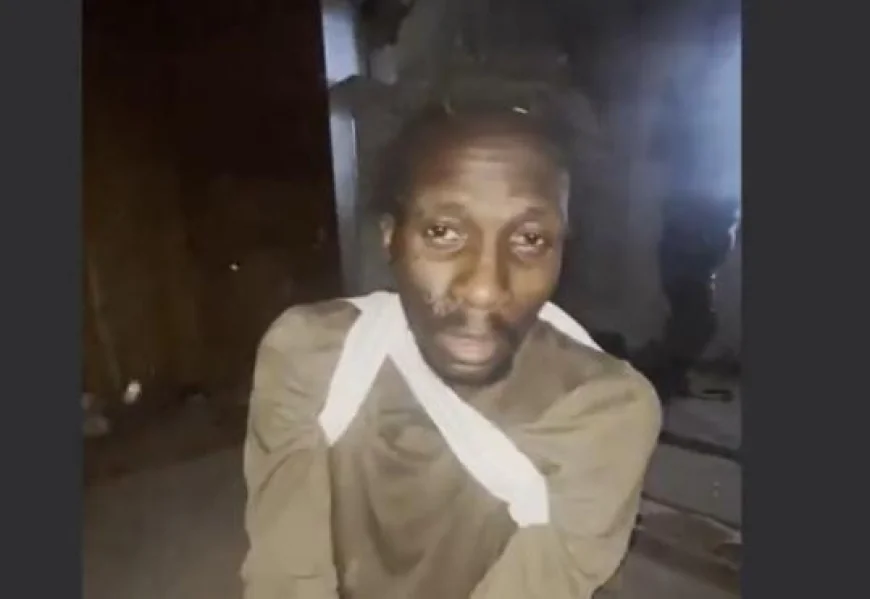Ukrainian soldiers have captured a Nigerian fighting for Russia. In return, they negotiated a shorter jail sentence for him.

Kehinde Oluwagbemileke, a Nigerian man fighting for Russia in the Ukraine conflict, has been caught by Ukrainian forces. His capture was confirmed by Ukraine’s “I Want to Live” project, which reports that the Freedom of Russia Legion, a group made up of Russian fighters supporting Ukraine, detained him.
Oluwagbemileke, 29 years old, was arrested in the Zaporizhzhia region after serving with Russian troops for five months. He had been living in Russia for four years before his detention, the project added. His arrest came after he agreed to join Russia’s military efforts, reportedly in exchange for a lighter sentence instead of a prison term under Russian law.
He is just one of many foreign fighters fighting for Russia. The Ukrainian group said there are nearly 7,000 fighters from 14 countries, but this is only part of the larger number sent to fight and die in Ukraine. They called these fighters cheap manpower, easily replaced by Russia.
A week earlier, Ukrainian forces captured another foreign soldier fighting for Russia. This time it was Wang Wu, a 24-year-old from China, who was also taken by Ukrainian troops.
Using AI, The Guardian transcribed the video shared by the legion. Below is the conversation:
Interviewer: Our stormtroopers have returned from a mission with an unusual trophy—Kehinde Oluwagbemileke. Apparently, due to a shortage of cannon fodder, Putin’s commanders are luring foreigners by deception to “defend the Motherland” in far-off Ukraine.
Interrogator: What is your passport?
Kehinde: Russian.
Interrogator: Russian passport?
Kehinde: Yes, Russian passport.
Interrogator: What did you do before?
Kehinde: Before?
Interrogator: Before joining the SVO. You joined the SVO?
Kehinde: Yes.
Interrogator: Why did you go to war?
Kehinde: For quick liberation.
Interrogator: Were you in prison?
Kehinde: Yes, in prison.
Interrogator: And then they freed you?
Kehinde: Yes.
Interrogator: How long have you been in the Army?
Kehinde: Five months.
Interrogator: Five months? Where is your family?
Kehinde: In Nigeria.
Interrogator: In Nigeria? Does your family know you went to war?
Kehinde: No.
Interrogator: They don’t know? Do you regret it?
Kehinde: Of course.
Interrogator: Do you regret going?
Kehinde: Of course. It’s… broken. (points to wounds)
Interrogator: Broken. Most of them are 200s.
Kehinde: Yes, yes.
Interrogator: How many 200s do you have? How many from your unit are alive? How many died?
Kehinde: Well, we were four. We went. One 200, the rest 300.
Interrogator: One 200, the rest 300. Lucky to be alive.
Kehinde: Lucky I’m alive.
Interrogator: You are lucky, yes. What did you do before that?
Kehinde: Translator.
Interrogator: Translator?
Kehinde: Yes. English to Russian.
Interrogator: Who did you translate for?
Kehinde: For those who don’t speak Russian.
Interrogator: In Russia?
Kehinde: Yes. There are people from South America, Africans, and Chinese.
Interrogator: Many Chinese?
Kehinde: Well, there were five or six of them there.
Interrogator: And Africans?
Kehinde: Africans, four people. With me, five—Nigeria, Ghana, Cameroon.
Interrogator: Did you come to study? Why Russia? You had nowhere else to go?
Kehinde: An adventure.
Interrogator: An adventure?
Medic: We’re going to inject you. This is an antibiotic, so your wounds don’t fester. Don’t flinch.
Kehinde: Oh. You’re so delicate everywhere. That’s good.
Medic: This is for the wounds.
Kehinde: Thank you. Thank you again. I am very grateful to the Freedom of Russia L
egion for saving my life and providing assistance, as you can see. And thank you. Thank you again.


